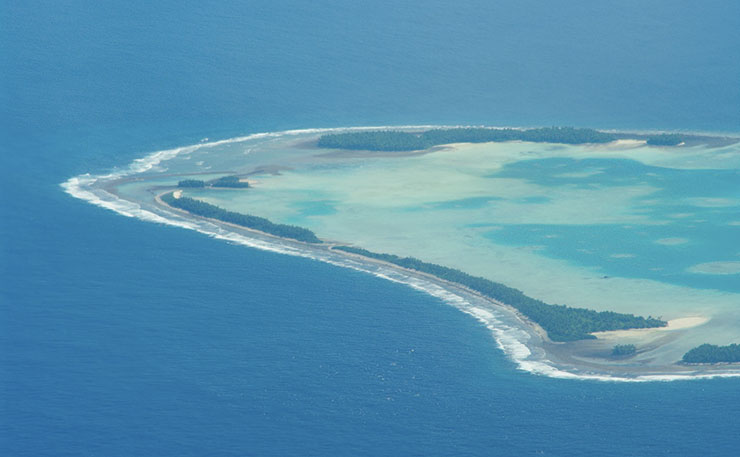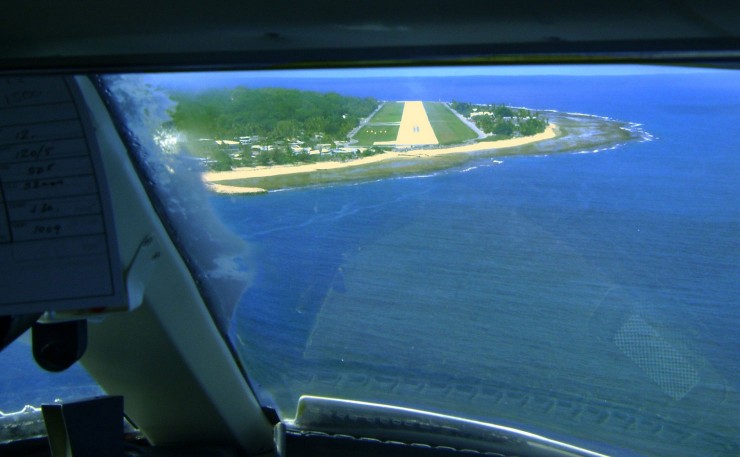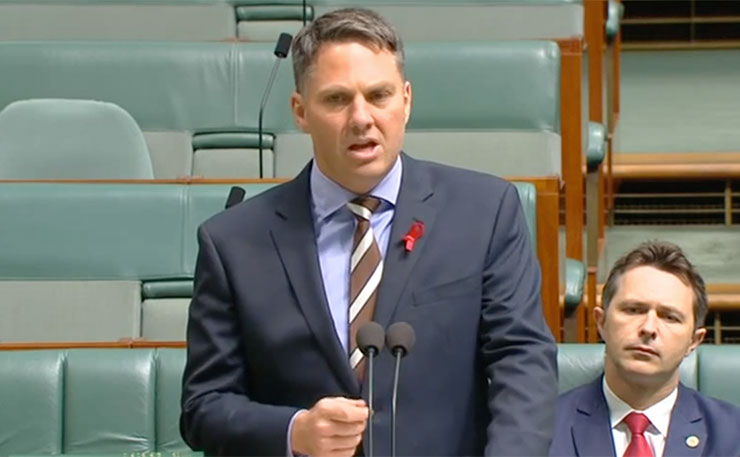To their credit, the Labor Party has begun talking about climate refugees. But what happens if they come from Nauru, asks Max Chalmers.
Labor’s immigration spokesperson, Richard Marles may not have done much to distinguish himself from the government during his tenure in the shadow ministry, but today he started a conversation you’re unlikely to hear come out of Peter Dutton’s mouth any time soon.
Fresh from a trip through the Pacific with fellow party heavyweights Bill Shorten and Tanya Plibersek, Marles ventured on to Guardian Australia to share his musings on the state of the region.
These are places where the sea is the source of food and legend, he wrote, and where a consistent pattern of rainfall has enabled life and culture to thrive. But that, like the world’s climate, is changing, and places such as Tuvalu are facing semi-permanent fresh water crises as a result.
According to Marles, that’s something we need to start talking about:
“…if climate change is placing the viability of communities in question, then inevitably some people will move as a result. So Australia being a destination for climate change migrants surely has to be up for discussion.
“Yet this is a public debate we have barely even begun. This does not have to be a scary debate for us. Australia has an annual net permanent migration intake of just over 200,000 people. The total combined population of the atoll nations of Kiribati and Tuvalu is about 120,000.
“Not all of these people will seek to come to Australia. Indeed none may come. And if any do, it will not be in the next few years and it will not be all at once.”
He didn’t quite say it, but the shadow minister appeared to be making the first hesitant steps towards outlining a moral case for Australia to accept climate refugees from the Pacific.

As a nation that has contributed a disproportionate amount of carbon to the atmosphere, and made itself rich by doing so, the impetus for us to respond strongly to the manifold repercussions of human-induced global warming should be high.
While limiting the damage is still the top priority – and keeping our coal in the ground a vital part of that strategy – some of the repercussions of a warmer world with higher sea levels have already been locked in. If people do start moving we should help them to protect their culture and find somewhere safe.
Climate migration is an awkward subject for Australian politics, seamlessly blending two domestic wedge issues into the unloved fields of international relations and development. Marles’ piece hinted at just that, arguing that having the debate now may prevent the issue being politicised in the future.
He was trying to insulate the issue from Australia’s post-Tampa refugee politics. Which is great, but there’s one big problem.
Thanks to a policy reintroduced by Marles’ own party, he can’t.
In pointing to the Pacific nations facing challenges as a result of climate change, Marles name-dropped the Marshall Islands, Kiribati, and Tuvalu. But he pointedly neglected to use the ‘N-word’ – Nauru.
For some years now, the place Australia chooses to send refugees who arrive by boat has been warning it will struggle to adapt to the impact of climate change.

Nauru’s highest point reaches just 65 metres above sea level. According to a 2007 World Health Organisation risk profile, the country is at risk due to its flat landscape, limited medical facilities, and financial difficulties. The risk from flooding, super storm events, and tidal surges will all increase in the coming years.
Four years before Marles’ opinion piece in the Guardian, Nauru’s permanent representative to the UN Marlene Moses was making similar points in the same publication.
“The sea around us is getting warmer, droughts have become commonplace, and the coastal erosion is as bad as anyone can remember,” she wrote.
“Similar trends are occurring across the Pacific and they have grave implications for the fish stocks we depend on for food, our freshwater supplies, and the very land we live on.”
Just last month the Nauruan government noted climate change could impact its economy and labour force by encouraging people to move to countries such as Australia, New Zealand, and Fiji.
This leads to an intriguing question. If Australia is prepared to take climate migrants from neighbouring countries, would that include refugees living in the community on Nauru? With only four refugees permanently resettled in a third country so far, that’s far from a hypothetical. Any future policy response would have to actively confront the contradiction.
If people in the Pacific do start moving, not all will need the same thing. Some will require temporary resettlement to help them escape major disasters, leading one academic to suggest Australia investigates the prospect of special humanitarian visas for those needing evacuation. Others will require a longer-term home.
If Labor wants to decouple the issue from Australia’s broader immigration debate it’s going to have to hurry up and find a new home for the hundreds of refugees currently living on the tiny Pacific island.
When contacted for comment Marles’ office said he didn’t have anything to add to the Guardian piece. At the time of writing no response had been received to further written questions.
Donate To New Matilda
New Matilda is a small, independent media outlet. We survive through reader contributions, and never losing a lawsuit. If you got something from this article, giving something back helps us to continue speaking truth to power. Every little bit counts.





